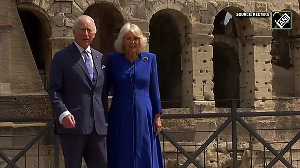It was a concern that India has voicing since 26/11 and today Maldives President Mohammed Waheed Hassan too has raised similar fears.
Terror-related activities in Maldives over the past three years have been subtle, but steady. Extremist Islamic forces are growing in strength and there's a threat that the country is slowly becoming one of biggest breeding grounds of self-styled jihadis after Pakistan and Afghanistan.
Does India have reason to worry? YES. It is after all the radical section of the Students Islamic Movement of India, which has infiltrated in Maldives and that too in large numbers. Sources in the Indian Intelligence Bureau confirm this fact. They also say that they have been constantly monitoring youth from Maldives, who are visiting to India.
Hassan expressed concern that most of these youth, mostly students, are taking to a very rigid version of Islam. Sources say that he is probably referring to the Wahhabi cult, a fundamentalist sect of Islam, which is being followed by the Al Qaeda.
After a ban on SIMI a few cadres went on to join the Indian Mujahideen, while there was another set of radicals who preferred to infiltrate into Maldives.
Youth who are hand picked by extremist outfits enter Maldives under the guise of pursuing education or securing jobs. From here the youth are sent to either Pakistan or Afghanistan where they are further radicalised, trained and prepared for the 'battle'. There has been a lot of talk about how the Lashkar-e-Tayiba is setting up a strong base in Maldives and would want to launch sea-borne attacks from this country. India is sure on the radar of such extremists, say sources.
In 2009, an Al Qaeda video showed how young men are being indoctrinated for terror. The Al Qaeda was then picking up Maldivian youth to battle in Afghanistan and according to records in that year alone nearly 150 youth from Maldives had gone missing and later found to be fighting along side the terror outfit.
The Lashkar on the other hand has been setting up camps in the country. However, there is little evidence to prove that youth from Maldives have been used to wage the Lashkar 'battle'.
Also, the arrangement with Maldives, which permits their citizens to stay in India for 90 days without a visa, has been exploited by outfits such as the SIMI and the Lashkar. A large number of Maldivians were found camping in Kerala and indulging in anti-India activities.
According to sources, the Lashkar and SIMI had their eyes on Maldives since 2007 bombing in Sultan Park near the Islamic Centre in the Maldivian capital Male, which injured 12 foreign tourists.
This was a way to establish their presence in Maldives. According to investigation, which was conducted on the basis of statements made by Asif Ibrahim, who was arrested for his role in the Male blasts, it was the Lashkar and the SIMI who were behind the attack.
However, the attack was not carried out by Jammat-e-Muslimeen, a shadow outfit floated for this purpose. India also had the investigation report on another operative Inas Moosa who was associated with this outfit.
The Sultan Park blast according to the experts was a turning point. There was a major hunt conducted post this attack and the police trail led to a mosque in Himendu, a Maldivian island where some of the militants were holed up. There was violence that followed and this in fact helped the recruitments surge.
Investigations pointed out that apart from Maldivians, nationals from India, Pakistan and Sri Lankans were involved in the attack.
According to the Intelligence Bureau, Idara Khidmat-e-Khalq, considered to be a front for the Lashkar, was sent to Maldives to help tsunami victims in 2004. Since then there has been a lot of anti-national activity in the country.










 © 2025
© 2025